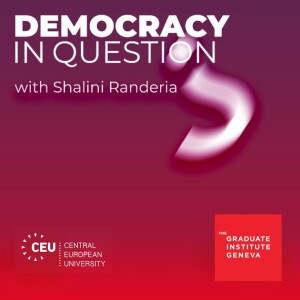
Holding Power Accountable with Investigative Journalism
 2022-01-12
2022-01-12
Democracy in Question? is brought to you by:
• Central European University: CEU
• The Albert Hirschman Centre on Democracy in Geneva: AHCD
• The Podcast Company: Novel
Follow us on social media!
• Central European University: @CEU
• Albert Hirschman Centre on Democracy in Geneva: @AHDCentre
Subscribe to the show. If you enjoyed what you listened to, you can support us by leaving a review and sharing our podcast in your networks!
BIBLIOGRAPHY
The Watchdog That Didn't Bark: The Financial Crisis and the Disappearance of Investigative Journalism (Columbia University Press, 2014).
GLOSSARY
What is ICIJ?
(00:0:45 or p.1 in the transcript)
The International Consortium of Investigative Journalists (ICIJ), is a U.S.-based nonprofit organization - which is both a small, resourceful newsroom with our own reporting team, as well as a global network of reporters and media organizations who work together to investigate the most important stories in the world. ICIJ encompasses 280 of the best investigative reporters from more than 100 countries and territories and is partner with more than 100 media organizations from the world’s most renowned outlets, including the BBC, the New York Times, the Guardian to small regional nonprofit investigative centers to collaborate on groundbreaking investigations that expose the truth and hold the powerful accountable, aligning the highest professional standards, fairness and accuracy. Source.
What are the Pandora Papers?
(00:0:50 or p.1 in the transcript)
The Pandora Papers is a collection of millions of leaked documents published by ICIJ in 2021 and the biggest journalism partnership in history, which have uncovered financial secrets of 35 current and former world leaders, more than 330 politicians and public officials in 91 countries and territories.
The investigation unmasks the covert owners of offshore companies, incognito bank accounts, private jets, yachts, mansions, even artworks– providing more information than what’s usually available to law enforcement agencies and cash-strapped governments and reveal the inner workings of a shadow economy that benefits the wealthy and well-connected at the expense of everyone else. Source.
What is the Enablers Act ?
(00:14:04 or p.3 in the transcript)
The Enablers Act (Establishing New Authorities for Business Laundering and Enabling Risks to Security (Enablers) Act) was a bipartisan bill proposed in the wake of the Pandora Papers. Legislation would require the treasury department to create new due-diligence rules for American middlemen who facilitate the flow of foreign assets into the United States. The act would update the 51-year-old Bank Secrecy Act, which requires banks to investigate their clients and the source of their wealth but had excluded trust companies, accountants, lawyers and other professionals. Source
What is the Heritage Foundation?
(00:19:03 or p.4 in the transcript)
Heritage Foundation, U.S. conservative public policy research organization, or think tank based in Washington, D.C. Its mission is “to formulate and promote conservative public policies based on the principles of free enterprise, limited government, individual freedom, traditional American values, and a strong national defense.” Founded in 1973 by two Congressional aides, Edwin Feulner and Paul Weyrich, it provides research on pending political issues to Congress, policymakers, news media, and academic communities. The foundation flourished during the presidency of Ronald Reagan (1981–89), who used its handbook Mandate for Leadership: Principles to Limit Government, Expand Freedom, and Strengthen America to provide guidance for his administration. Source.
What is the Brookings Institution?
(00:19:05 or p.4 in the transcript)
Brookings Institution, not-for-profit research organization based in Washington, D.C. founded in 1916 as the Institute for Government Research by the merchant, manufacturer, and philanthropist Robert S. Brookings and other reformers. In 1927 it merged with two other institutions established by Brookings, the Institute of Economics (1922) and the Robert S. Brookings Graduate School of Economics and Government (1924), to form the Brookings Institution. Devoted to public service through research and education in the social sciences, particularly in economics, government and foreign policy is one of the most influential think tanks in the US. Source.
More Episodes
 2022-06-22
2022-06-22
 2022-04-13
2022-04-13
 2022-03-30
2022-03-30
 2022-03-16
2022-03-16
 2022-03-02
2022-03-02
 2022-02-09
2022-02-09
Create your
podcast in
minutes
- Full-featured podcast site
- Unlimited storage and bandwidth
- Comprehensive podcast stats
- Distribute to Apple Podcasts, Spotify, and more
- Make money with your podcast
It is Free
- Privacy Policy
- Cookie Policy
- Terms of Use
- Consent Preferences
- Copyright © 2015-2024 Podbean.com




